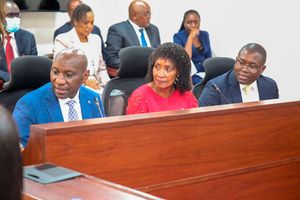
TSC published the list of 25,252 teachers whose applications for various promotion positions were successful on April 2, 2025.
Machakos County had the highest number of teachers promoted (690) while Garissa County had the least (303) number moving up the ladder in the latest exercise that was rejected by the National Assembly.
An analysis of data of the promotions from the Teacher Service Commission (TSC) shows the positions were shared with slight variances across the counties irrespective of the size or number of applicants in each county.
The list, which was provided to the Committee on Education of the National Assembly, shows the number of vacancies available across the various job grades and the number that went to each county.
However, the MPs last week dismissed the list and gave the TSC up to Thursday next week to present detailed criteria of how the promotions were made.
The commission published the list of 25,252 teachers whose applications for various promotion positions were successful on April 2, 2025.
However, the list sparked immediate uproar from education stakeholders, with a section of MPs and teacher unions rejecting it citing unfairness.
The Education Committee, which is chaired by Julius Melly (Tinderet, UDA), accused the TSC of using an opaque promotion criteria and failing to uphold principles of equity.
They argued that the promotions disproportionately favoured certain regions and left out deserving candidates in other areas.
He questioned the logic behind what appeared to be a uniform distribution of promotions across counties, saying it deviated from past practices and ignored population dynamics.
“How do you promote someone three times in a row while others have been stuck in one job group for over a decade?” posed Mr Melly.
Mr Melly said that some teachers had been promoted many times within a short period leaving out other deserving cases who had more experience.
On Friday, he told Nation.Africa that the committee will investigate cases of multiple promotions of newly employed teachers at the expense of others who have been shortlisted, interviewed but never promoted over the years.
The MPs want information showing the number of years teachers have served in particular job grades before promotion.
While appearing before the Committee on Education, TSC Chief Executive Officer Nancy Macharia defended the process, stating it was legally grounded and decentralised to ensure regional representation.
“Aligning promotion policies with legal and regulatory frameworks: The promotion process strictly adheres to Regulation 73 of the Code of Regulations for Teachers (CORT), the Career Progression Guidelines (CPG), and the Policy on Selection and Appointment of Institutional Administrators,” she said.
Teachers’ unions demanded that the commission withdraw the published list of promoted teachers, citing unfair distribution of opportunities across counties.
However, in its defence, the TSC provided data to show the numbers for common cadre promotions and those promoted under the affirmative action for the 2024 – 2025 Financial Year, where 5,291 teachers were promoted across all 47 counties.
For example, the top counties to benefit from the programme are Isiolo (282), Lamu (280) and Mandera (270). Counties that received the least promotions under the programme are Kiambu (46) Nairobi and Murang’a (63 each), Elgeyo Marakwet and Laikipia (64 each).
The promotions span nine different grades, from C2 to D5.
The largest number of promotions occurred within grades C4 and C5, which saw 8,508 and 5,425 teachers promoted respectively.
This was followed by 4,971 to grade C3, 2,519 to D1, 1,445 to C2, and 1,410 to D3.
The higher executive levels, though fewer in number, saw 799 teachers promoted to D2, 128 to D4, and 47 to D5, signalling progress in strengthening senior leadership in schools.
The acting Secretary General of the Kenya Union of Post Primary Education Teachers (Kuppet) Moses Nthurima has faulted the TSC over what he terms unfair distribution and promotion of teachers across counties.
“Some regions have been disadvantaged. If the 25,000 slots were not divided proportionally based on the number of teachers per county, it means counties with higher teacher populations are suffering. You can imagine those people who have stagnated for years will be left out. While in some counties they promoted teachers who have only served for six months, in others, teachers who've served for over ten years were ignored,” he told the Nation.
Mr Nthurima questioned the criteria used by TSC, noting that while the official matrix for promotion includes years of service, performance, and academic qualifications, these seem not to have been followed.
"They are now saying they considered age as well, but age has never been a primary factor. The key elements are years of service, duties performed, and performance in both curricular and co-curricular activities," he stated.
He challenged the TSC to explain how teachers with only six months of service were promoted when the policy requires a minimum of three years. He also decried the lack of consultation, saying the union was never engaged.
"We want to understand what informed such promotions. Unless there are other hidden considerations, it is clear that many deserving teachers have been side-lined. We wrote to the TSC, but they have never responded. They don't engage unions. They believe unions are irrelevant," he said.
Mr Nthurima pointed out that teachers in populous counties like Kakamega, Kiambu, and others were the most affected, especially deputy principals and principals who have served in acting capacities for years without confirmation.
"Some teachers have served as deputies or principals for six or seven years and are still being left to serve in acting capacities while others in less populated counties are being promoted," he said.










